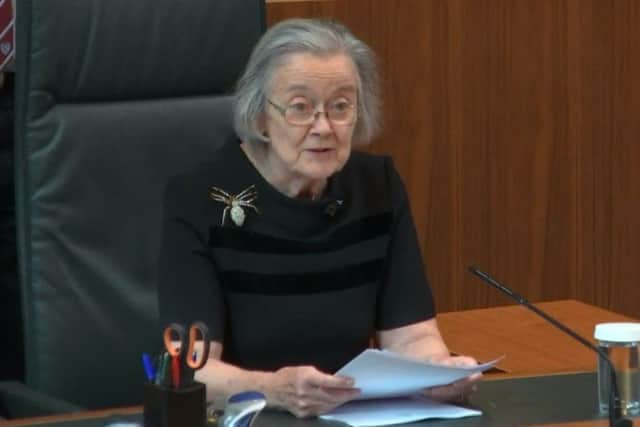Elaine Motion: No-one is above the law, as the PM discovered


When she announced the decision was unanimous, I was very hopeful the court was going to go as far as only our clients had asked it to do. Soon afterwards, I turned to Joanna Cherry MP, the lead petitioner, and whispered: “We’ve got it. We’re there.”
And we were, as the Supreme Court decided the Prime Minister’s prorogation of parliament was unlawful and it was as if it had never happened.
Advertisement
Hide AdAdvertisement
Hide AdI was very emotional. In constitutional terms, this was as big as it gets; the UK’s highest court reinforcing the relationship between the executive and the legislature and finding that no-one is above the law.


Earlier, there was an incredible buzz, inside and outside the Supreme Court – something I’d never experienced before. There was a sense of expectation – and hope. I was cautiously hopeful, but no more than that.
The delivery of the ruling by Lady Hale, President of the Supreme Court, was extraordinarily powerful. This was hugely complex law but she explained it with incredible clarity and simplicity – to the court and the four million people watching online.
I was intimately involved in the case – as the solicitor instructed by the 70-plus petitioners – yet even I never imagined the level of interest as Lady Hale delivered the judgment with such aplomb.
It has been described as the coming of age for the UK Supreme Court. It had found its voice in constitutional terms, holding the executive to account to protect the sovereignty of parliament and the rule of law.
It ruled that nobody, including the Prime Minister, can carry out unlawful acts and that the courts can, and should, deal with such unlawful acts.
I was delighted to see such a broad church of parliamentarians – SNP, Labour, Plaid Cymru, Green and Lib Dem – at court for the historic decision. They had shown immense courage, alongside Jolyon Maugham QC of the Good Law Project, in standing up for what they believed to be right in a very divisive, emotionally-charged environment.
I had two glasses of champagne, then got the train back to Edinburgh. We’d had a big win, but this was far from the end of the story. Our attention turned immediately to the European Union (Withdrawal) (No 2) Act 2019, which followed the UK Parliament’s decision that it wouldn’t support a no-deal Brexit.
Advertisement
Hide AdAdvertisement
Hide AdThe Act required the Prime Minister to sign a letter to the EU asking for an extension until 31 January 2020 if he failed to get a Brexit deal agreed at Westminster by 19 October 2019.
We wanted to make sure the Prime Minister complied with the Act because his public pronouncements, backed by briefings from ‘Downing Street sources’ and Cabinet members suggested he was prepared to leave the EU on 31 October - deal or no deal.
The same principle applied to this case as the one which ended with Lady Hale’s unanimous ruling – that the executive could not override parliament. We progressed two cases, including a nobile officium, which only exists in Scotland and allows the courts to provide a remedy in a legal dispute where none exists. In this case, that would mean the Court of Session signing the letter if the Prime Minister refused/failed to when required,
The case moved incredibly quickly. The Prime Minister’s legal team said, for the first time, that he would sign the letter and not seek to frustrate the Act, therefore, no undertaking was necessary. The Outer House of the Court of Session agreed, saying there was “no doubt” the Prime Minister had agreed to abide by the law. Yet Downing Street briefings and ministerial tweets continued, saying the UK would leave the EU on 31 October – and we appealed to the Inner House.
Last week, three judges appreciated the time-sensitive nature of the issues and that the court could not make a definitive ruling on whether the Prime Minister had broken the Act until the 19 October deadline had passed and it had the chance to assess the factual position at that time.
Final rulings were therefore held over until 21 October.
My clients hope they don’t have to return to court on 21 October, that politics will run its course and the law will be complied with.
Meanwhile, a Sword of Damocles hangs over the Prime Minister’s head – comply and sign the letter if required or come back to court.
We all sincerely hope he will sign – not just for my clients but for anyone who cares about the rule of law and the need to abide by it, whatever the circumstances.
Elaine Motion is Executive Chairman of Balfour+Manson